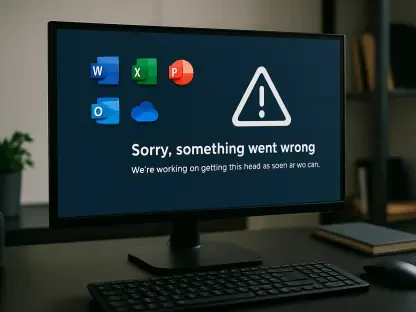I’m thrilled to sit down with Rupert Marais, our in-house security specialist with deep expertise in endpoint and device security, cybersecurity strategies, and network management. With a sharp eye on the ever-evolving landscape of cyber threats, Rupert brings invaluable insights into protecting digital assets. Today, we’re diving into the recent critical vulnerabilities in WordPress plugins that have caught the attention of threat actors worldwide. Our conversation explores the nature of these security flaws, the risks they pose to website owners, the scale of ongoing attacks, and actionable steps to stay safe in this challenging environment.
Can you walk us through the recent security issues with WordPress plugins that have been highlighted by recent reports?
Absolutely, Helen. There’s been a significant concern over critical vulnerabilities in two popular WordPress plugins: GutenKit and Hunk Companion. These plugins have a combined active installation base of over 48,000 sites, with GutenKit alone accounting for more than 40,000. The flaws in these plugins are severe, allowing attackers to potentially take full control of affected websites, which is why this has become such a pressing issue for the WordPress community.
What exactly are the critical vulnerabilities being exploited, and why are they so alarming?
We’re dealing with three specific vulnerabilities, each with a CVSS score of 9.8, which indicates their severity. The first, CVE-2024-9234, impacts GutenKit and lets attackers install and activate malicious plugins or even upload harmful files disguised as plugins. Then there’s CVE-2024-9707 in Hunk Companion, which also allows unauthorized plugin installation leading to potential remote code execution if paired with another vulnerable plugin. Lastly, CVE-2024-11972 is a bypass for the previous flaw in Hunk Companion, making it just as dangerous. These are alarming because they give attackers a direct path to hijack entire sites with little to no barrier.
Could you explain what remote code execution means in this context and why it’s such a big deal for WordPress site owners?
Remote code execution, or RCE, is essentially a way for attackers to run malicious code on a website’s server without needing any legitimate access. In the case of these WordPress vulnerabilities, it means attackers can upload harmful scripts or files and execute them, effectively taking over the site. Once they’re in, they can steal data, deface the site, use it to spread malware, or even turn it into a launchpad for further attacks. For site owners, this is a nightmare scenario because it compromises not just their website but also their users’ trust and safety.
How were these vulnerabilities initially uncovered, and what protective measures have been rolled out for users?
These issues were first identified through a bug bounty program on September 25 and October 3, 2024. Following the discovery, immediate steps were taken to safeguard users, including updating firewall rules to block known attack patterns. However, not everyone is automatically protected—only those using specific security solutions benefit from these updates. Many organizations and individual site owners remain at risk if they haven’t updated their plugins or implemented additional defenses, which underscores the need for proactive security hygiene.
Can you shed some light on the scale of the attacks targeting these vulnerabilities?
The scale is quite staggering. Nearly 8.8 million exploitation attempts have been blocked so far, which shows how aggressively threat actors are targeting these flaws. The campaign saw a significant resurgence on October 8, 2024, suggesting that attackers are highly motivated and likely sharing exploit techniques among themselves. This kind of persistence tells us that these vulnerabilities are a goldmine for cybercriminals, and they won’t stop until the majority of vulnerable sites are patched or compromised.
What immediate steps should WordPress site owners take to protect their websites from these threats?
First and foremost, site owners need to update or remove the affected plugins. For GutenKit, that means ensuring you’re beyond version 2.1.0, and for Hunk Companion, you should be past versions 1.8.4 and 1.8.5 for the respective vulnerabilities. Beyond that, run a security scan to check for signs of compromise—look for unfamiliar plugins or files. Implementing a web application firewall and regularly monitoring for suspicious activity can also add layers of defense. Don’t wait for an attack to happen; act now.
There’s been mention of a list of attacker IP addresses and domains being shared. How can website administrators use this information to bolster their security?
This list is a valuable resource for admins. It provides specific indicators of compromise, like IP addresses and domains used by attackers, which can be used to block malicious traffic before it even reaches your site. You can feed this data into your firewall or intrusion detection system to filter out known threats. I’d also recommend using tools like security information and event management systems to continuously monitor for any matching activity. Being proactive with this intel can significantly reduce your risk of being targeted successfully.
What’s your forecast for the future of WordPress security in light of these recent exploits?
I think we’re going to see an ongoing cat-and-mouse game between developers, security researchers, and threat actors. WordPress powers a huge chunk of the internet, making it a prime target for attackers. These recent exploits highlight the importance of rapid patch deployment and user education. My forecast is that we’ll see more sophisticated attacks leveraging plugin vulnerabilities unless the ecosystem tightens up on vetting processes and enforces stricter security standards. On the flip side, I expect security tools and community efforts to grow stronger, but only if site owners stay vigilant and prioritize security as much as functionality.









